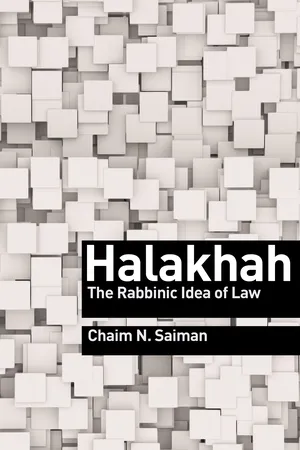About this book
How the rabbis of the Talmud transformed everything into a legal question—and Jewish law into a way of thinking and talking about everything
Though typically translated as "Jewish law," the term halakhah is not an easy match for what is usually thought of as law. This is because the rabbinic legal system has rarely wielded the political power to enforce its many detailed rules, nor has it ever been the law of any state. Even more idiosyncratically, the talmudic rabbis claim that the study of halakhah is a holy endeavor that brings a person closer to God—a claim no country makes of its law.
In this panoramic book, Chaim Saiman traces how generations of rabbis have used concepts forged in talmudic disputation to do the work that other societies assign not only to philosophy, political theory, theology, and ethics but also to art, drama, and literature. In the multifaceted world of halakhah where everything is law, law is also everything, and even laws that serve no practical purpose can, when properly studied, provide surprising insights into timeless questions about the very nature of human existence.
What does it mean for legal analysis to connect humans to God? Can spiritual teachings remain meaningful and at the same time rigidly codified? Can a modern state be governed by such law? Guiding readers across two millennia of richly illuminating perspectives, this book shows how halakhah is not just "law" but an entire way of thinking, being, and knowing.
Frequently asked questions
- Essential is ideal for learners and professionals who enjoy exploring a wide range of subjects. Access the Essential Library with 800,000+ trusted titles and best-sellers across business, personal growth, and the humanities. Includes unlimited reading time and Standard Read Aloud voice.
- Complete: Perfect for advanced learners and researchers needing full, unrestricted access. Unlock 1.4M+ books across hundreds of subjects, including academic and specialized titles. The Complete Plan also includes advanced features like Premium Read Aloud and Research Assistant.
Please note we cannot support devices running on iOS 13 and Android 7 or earlier. Learn more about using the app.
Information
Table of contents
- Cover Page
- Title Page
- Copyright Page
- Dedication Page
- Contents
- Preface
- Acknowledgments
- Introduction
- Part I. The Nature of Halakhah
- Part II. Talmudic Readings
- Part III. Between Torah and Law: Halakhah in the Post-Talmudic Period
- Conclusion
- Glossary
- Notes
- Further Readings
- Index
